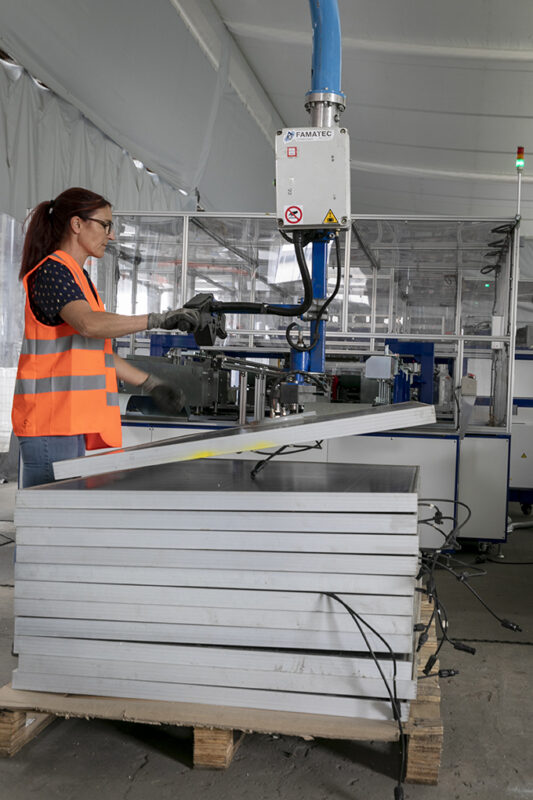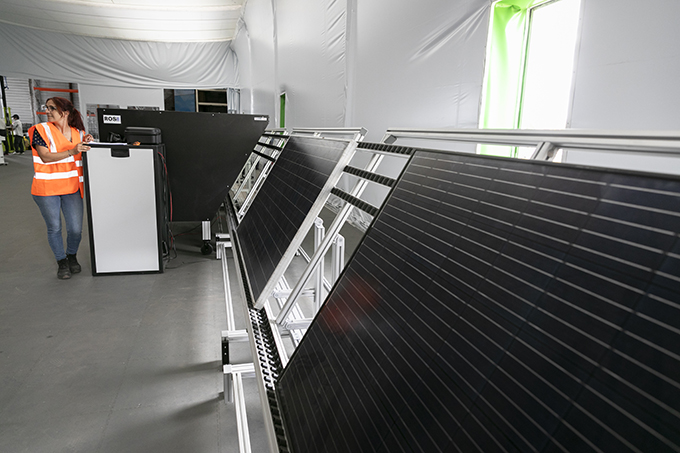In France, the solar recycling sector coordinated by the eco-organization Soren focuses on the circular economy of strategic module materials, the development of innovative industrial recycling solutions with high added value and the structuring of the recycling sector.sustainable use of panels.
In France, as elsewhere in Europe, the recycling sector aims to recover 87% of waste electrical and electronic equipment (WEEE) and 85% of its weight. However, for solar panels, the quantitative vision of recycling is limited.
teraIndeed, while glass and aluminum together account for 83% of the module’s weight, which is close to the European target, they only combine for a little more than 20% of its value. The sector’s strategic materials are silver (0.08% by weight) and high-purity silicon (2.98% by weight), which represent 20 and 40% of the value of a classic silicon module, respectively. And it is precisely these metals that are of interest to the French recycling sector, coordinated by the eco-organization Soren, in addition to copper.

Source: Solar PV Global Supply Chains Special Report, IEA, 2022
“We have to move away from a quantitative vision of recycling,” explains Nicolas Defrenne, director of Soren during an interview with magazine pv. The company is responsible for the collection and processing of used photovoltaic panels in France and has decided to focus on recycling with high added value and developing a sustainable and regulated market for the reuse of modules.
From a practical point of view, the manager reminds that the owners of panels at the end of their useful life are obliged to return the used modules to an approved channel, i.e. to France Soren. Two processes are possible: voluntary collection for holders of less than 40 panels at defined locations for apartment owners and small power plants (representing approximately 10% of total flows) and on-site collection for power plants. benefit from a shipping container for a large number of panels.
Development of a circular economy based on strategic solar materials: a necessity
For the manager, improving the quality of recycling in the context of the “green” sector is not only a necessity, but also an economic problem. “If we take a 25-year projection, the average warranty for a solar panel, it is more interesting to invest in innovative recycling solutions to get the most value over the years,” says Nicolas Defrenne. This is good from an economic point of view and from an industrial point of view because it forces us to develop more innovative recycling units. It is also a step towards industrial sovereignty with less dependence on strategic metals. »
This is also the opinion of the IEA, which he stated in his report on Global Energy Outlook 2022 that heavy reliance on self-sufficient countries such as China for the supply of strategic minerals (and associated green technology supply chains) poses a risk to the global energy transition.

Image: Soren
For Nicolas Defrenn, it’s also a matter of pragmatism: “1 terawatt of solar panels represents 94% of the world’s annual silver production”. We should therefore focus on a circular economy with high-quality recycling in order to achieve the announced goals of introducing photovoltaics.
“The WEEE Directive is not perfect, but we can improve it by adding targets on, for example, strategic metals,” says Nicolas Defrenne. The European battery regulations (known as the Battery Law), which appeared earlier this year, already contain specific targets by material, which is an encouraging sign for the manager.
Industry challenges: good and bad practices
If all the panels went to the recycling or reuse phase, the dynamics of the sector would certainly increase. But almost 40% of end-of-life panels in Europe are eventually exported to other markets (often in Africa) and fall through the cracks of Soren. “It’s a new problem, a few years ago we didn’t face this type of process,” explains Nicolas Defrenne. And these flows are difficult to estimate because certain modules can actually be reused. »
In reported cases, the various parties agree on a summary visual inspection sometimes accompanied by a performance test. These operations, which fall into a gray zone, sometimes bordering on the illegal export of waste, are not subject to any safety and durability tests. If some players in the industry can afford not to respect best practices, it is also because there is a lack of definition of an end-of-life panel. And an alternative to the second “wild” life of panels in a market that develops without best practices.

Image: Soren
To remedy this, Soren began a cycle of work with the IPVF in 2023 on topics related to the second life. “We saw a lot of enthusiasm in the sector, as more than 50 companies in the sector wanted to participate,” enthuses Nicolas Defrenne. In 2024, the organization will also launch a call for expression of interest (AMI) to develop a technical recertification of player panels for reuse.
The industry has also created a fund of 3 million euros for the period 2023 and 2027, intended to support second life players who respect specific specifications and guarantee safety, sustainability and performance. For visibility in this growing market, a label obtained after four tests, currently in development, will be issued. “The aim will be to find a balance between carrying out tests that guarantee a satisfactory framework, especially in terms of insurance, but also the economic viability of the second life sector”, sums up Nicolas Defrenne.
This content is copyrighted and you may not reuse it without permission. If you would like to collaborate with us and reuse our content, please contact our editorial team at the following address: editors@pv-magazine.com.

